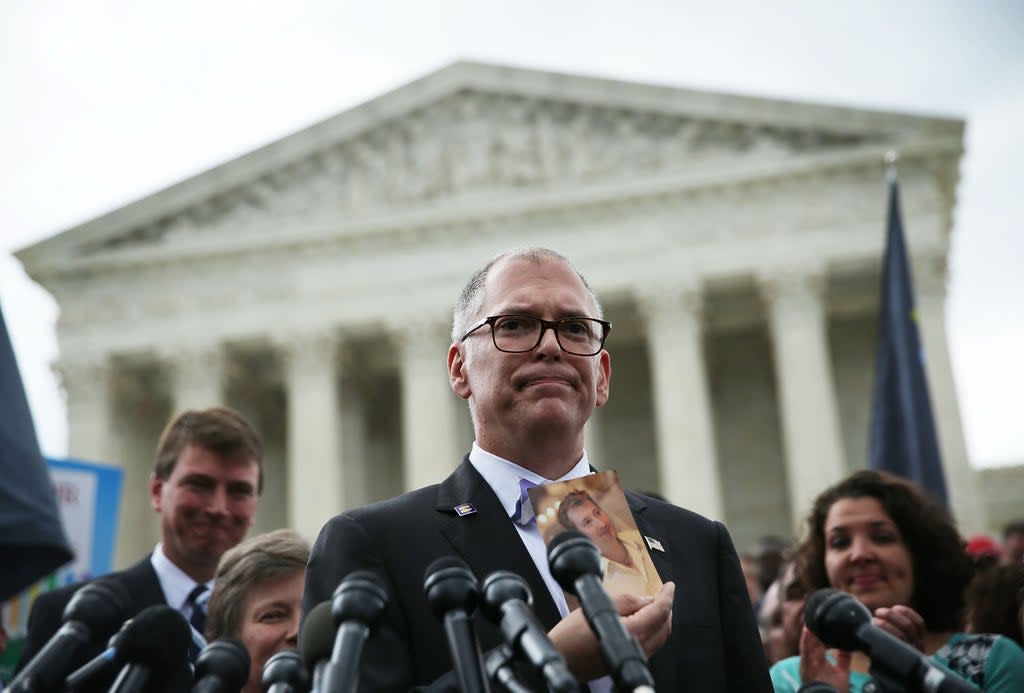‘Scares the daylights out of me’: Man behind gay marriage law fears it will be overturned after Roe v Wade

The man whose landmark US Supreme Court case led to the legalisation of gay marriage in America has said the court’s majority opinion over Roe v Wade “scares the daylights out of me” as fears are growing that LGBT+ rights could be overturned next.
Jim Obergefell released a statement on Tuesday warning that the most basic human rights are now “under siege” following Monday night’s leak of the bombshell Supreme Court draft opinion.
“The extreme US Supreme Court should not be overturning decades of established law and denying the most basic human health rights to pregnant people to make their own decisions about their lives and their bodies,” he said.
“The sad part is... five or six people will determine the law of the land and go against the vast majority of Americans who overwhelmingly support a person’s right to make their own health decisions and a couple’s right to be married.
“This is a sad day, but it’s not over. We have fought the good fight for too long to be denied our rights now.”
Mr Obergefell found himself at the centre of the LGBT+ community’s fight to legalise same-sex marriage back in 2013 when he married his long-term partner John Arthur.
The couple, who lived in Ohio where same-sex marriage was illegal, had to fly to Maryland to be able to marry.
They wed inside a medical plane on the airport tarmac as Mr Arthur was gravely ill with amyotrophic lateral sclerosis – a disease of the nervous system.
Just three months and 11 days later, Mr Arthur died and the state of Ohio refused to list his partner of 22 years as his legal spouse on his death certificate due to the ban on same-sex marriage in the state.
A two-year legal battle ensued, going all the way up to the Supreme Court.
In 2015, the court made its landmark ruling on Obergefell v Hodges, legalising same-sex marriage across the country and marking the biggest step forward for LGBT+ rights in American history.
Now, LGBT+ rights activists fear this law could also come under attack following the Supreme Court’s vote to dismantle abortion rights across the country.
Mr Obergefell told CNN that while the backpedaling of abortion rights marks “a dark day for women in our nation,” he also fears it means that “marriage equality is next” to potentially be axed.
“It scares the daylights out of me,” he said.
Mr Obergefell said that if the protections offered by the 14th Amendment right to privacy are under attack, then this could extend further afield than reproductive rights and abortion access.
“Many of the rights we enjoy, especially the LGBTQ+ community, are based on unenumerated rights under the 14th Amendment — the right to privacy,” he said.
“If the Constitution doesn’t specifically, in writing, outline that right to privacy, then all of those rights that have been affirmed for us that are based on the right to privacy under the 14th Amendment are at risk.”
The draft majority opinion, obtained by Politico and confirmed to be authentic by the court on Tuesday, revealed that the nation’s highest court had decided to strike down the landmark Roe v Wade ruling that grants Americans a constitutional right to an abortion.
The draft majority opinion on the case, obtained by Politico, was written by Justice Samuel Alito and revealed that he and four other conservative justices – Clarence Thomas, Neil Gorsuch, Brett Kavanaugh and Amy Coney Barrett – had voted to overturn the ruling.
Liberal Justices Stephen Breyer, Sonia Sotomayor and Elena Kagan dissented while it is unclear how Chief Justice John Roberts planned to vote.
In the opinion, the majority said that the ruling had been wrongly decided in the past and that decisions around abortion access should be decided by politicians, not by the courts.
“We hold that Roe and Casey must be overruled,” writes in the majority opinion.
“It is time to heed the Constitution and return the issue of abortion to the people’s elected representatives.”
The court drafted the opinion after agreeing to hear a case around a Mississippi law which criminalised abortions after 15 weeks.
Never in the history of the Supreme Court has a draft opinion been leaked and the court has so far refused to comment.
Politico said it had conducted “an extensive review process” and had confirmed the draft’s authenticity.
The opinion is a draft and it is possible that votes will change prior to its publication which had been expected in late June.
However, if released as it stands it will backpedal on abortion rights and access to reproductive health for millions of women across America and leave many with no choice but to either carry an unwanted pregnancy to term or seek out potentially dangerous illegal healthcare options.
It comes at a time when Republican-led states have taken their own strides in restricting abortion access in recent months.
Last year, Texas led the way introducing the most extreme abortion law in the US and effectively undercutting Roe v Wade.
The “Texas Heartbeat Act” bans abortions from when a foetal heartbeat can be detected – typically after just six weeks, at a time before many women even know they are pregnant.
Texas’ law makes no exceptions for women who are victims of rape or incest and gives private citizens the right to sue anyone who gets an abortion or helps someone get an abortion.
While the law drastically limited access, a woman’s legal right to have an abortion in America was protected under Roe v Wade.
About two dozen other states including Alabama and Oklahoma have laws ready to go to effectively ban abortion if Roe v Wade is overturned.
In 1973, the landmark ruling recognised a woman’s constitutional right to choose to have an abortion across America for the first time and effectively made it legal nationwide.

